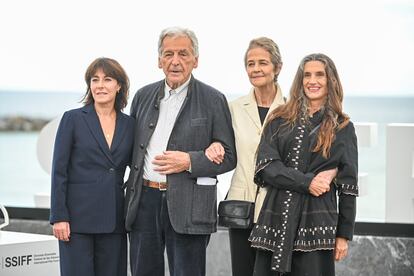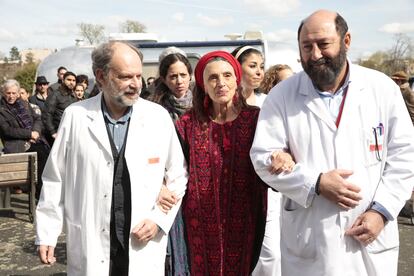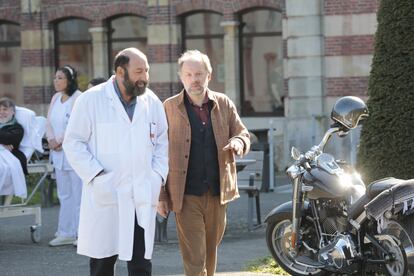At 91, the French-Greek filmmaker Costa-Gavras has little left to prove. “He does have to tell, because that is where the world is,” he says. And in that observation, after decades of thrillers politicians (Z, State of Siege, Missing, The Music Box) and social and economic dramas (Amen, Capital, Behaving like adults), The time has come for him to talk about what he considers an intrinsic part of life: death. “At my age, if I don’t face it…,” he laughs. In the San Sebastian competition, the director presents The last breath, a free adaptation of the book of the same name by another important French intellectual, Régis Debray, co-written with palliative care physician Claude Grange, in which they reflect on how (badly) contemporary society deals with death, and even more so when a human being becomes the plaything of a terminal illness.
Yet, The last breath It is not a tragedy. There is a certain humour about the patients the doctor treats. The filmmaker has a doctor brother in Boston (like the writer of the film), with whom he has already spoken about his future death in case the case arises (“And he tells me no, that he will not help me with a possible euthanasia”), because Costa-Gavras hopes that his death will be “with dignity, with courage… and if it takes too long, that they give me the injection”. Given his physical condition, one hopes that this will happen within 15 or 20 years. “Fifteen years? That is a lot.”
His brother is a good example of “that even the best doctors are imbued with this mentality of prolonging agony.” So on the one hand, he received the book by Debray, “a friend of many years,” and on the other, he understood that it was time for “cinema to help us understand death a little better.”
In his speech, the director mixes French and Spanish, sprinkled with Italian words. He is didactic in his answers and assures us that it is necessary for us all to talk about death: “I am the first. I never tire of doing so because I think it is important. From the beginning of the script I understood that I was undertaking a journey about the last journey. Obviously, I had to find the cinematic rhythm and the characters, and some of them were given to me by reality: many of the doctors and nurses who appear on screen are those who really dedicate themselves to that profession.” What did you discover in palliative care medical centres? “A world completely apart from ours. The staff works doing their job, as if they were with their parents. Of course, without anguish, without sadness. And that was an essential discovery for me.”
Costa-Gavras rubs his hands. The conversation is moving into the territory he wants: “There is not enough interest in palliative care. First of all, that. Secondly, what do we do with people who are getting older, who are getting older, in good health? Because these people may one day say: ‘I want to die’. How do we help them? In France, there will soon be 30,000 people over 100 years old. Many of them live in a very bad way, they no longer know the people around them, because their friends have died, their children… That is why the suicide rate is so high after the age of 80, because the pain takes hold and because many of these suicides hide desperate people who are applying euthanasia to themselves.”

Why is death so rarely discussed? “When you are a child, we are scared with it. ‘Be careful, if you do that, you could die.’ In adolescence and youth, you believe yourself to be immortal. And later, we let ourselves be consumed by anxiety. I am very struck by the amount of pornography that surrounds us and how easy it is to access it, as if we thought that this was a celebration of life, and how little we reflect on death. When all of us, sooner or later, are going to encounter it.”
The filmmaker does not want this to be his last film, but he does not know either. If it were, The last breath Costa-Gavras is pursuing a career of undeniable commitment to social issues and justice, something that he considers part of being left-wing. Does he worry about his legacy? “I like the word ideology. I don’t think it’s a stinking term. For me, in this film there is ideology in the silences, the caresses, the care. It’s another thing when many people use false ideological terminology to defend fanaticism. Not there, that’s why I don’t agree.” And he takes a deep breath: “I don’t know if the left of half a century ago is the left of today… I have made few films (about twenty) compared to other filmmakers. Because I have maintained my personal philosophy, I have put my life, my family, my feminism and my way of approaching work before the economy.”

Which brings you to another concern that doesn’t appear in The last breath although it has been in previous films: the hypocritical solidarity of the 21st century. “It makes me very angry. Since at the beginning of the 21st century it was decided that ideologies were dead, we stopped talking about quality of life, we hid under the carpet issues that concern me. Communism is dead and with that we move on to something else. What a smokescreen. The thing is, do you know the only thing we talk about these days? Money. And it’s terrible,” he says, raising his voice.
Can these problems be solved? The director’s eyes light up. “I think so, and that’s partly why I made this feature film. It’s called humanity.” Throughout the story, there are numerous characters living out their final days and hours, played by a host of great actors. “They all accepted at first, including Charlotte Rampling, whom I convinced by pointing out that her role was very short and sending her the script,” the director laughs.
The first patient the philosopher sits down with has only a few days left in her life. He asks her what she believes in, and discovers that this old woman has enjoyed a full life across several continents, and that she knows more about beliefs, religions and reincarnations than the intellectual, who at first has not been able to see beyond a sick body. “I love this female character, who was not in the book, because it illustrates society’s blindness in seeing in the elderly only a shell of old people.” And what does Costa-Gavras believe in? “Me? In life.”

